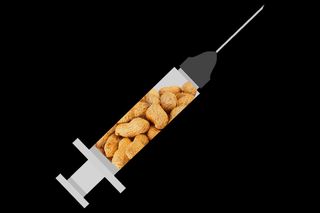
Peanut Allergy ‘Vaccine’ Shows Success in Mice Trials
Immunotherapy treatment might cure fatal reactions.

A vaccine may successfully cure peanut allergy in mice, a new study suggests.
After nearly two decades of research, researchers at the University of Michigan in the US have found three monthly doses of a nasal vaccine protected the mice from allergic reactions upon exposure to peanut. While not a vaccine in the traditional sense, the new approach activates a different type of immune response that prevents allergic symptoms.
“We’re changing the way the immune cells respond upon exposure to allergens,” says lead author Jessica O’Konek, PhD, a research investigator at the University’s Mary H. Weiser Food Allergy Center. “Importantly, we can do this after allergy is established, which provides for potential therapy of allergies in humans.”
The mouse models studied had the same allergic response to peanuts as affected humans, with symptoms that included itchy skin and trouble breathing. The study assessed protection from allergic reactions two weeks after the final dose of vaccine was administered. Studies to determine duration of protection are ongoing, but researchers are encouraged that this treatment will lead to long-lasting cure of allergies.
“Right now, the only FDA-approved way to address food allergy is to avoid the food or suppress allergic reactions after they have already started,” O’Konek says. “Our goal is to use immunotherapy to change the immune system’s response by developing a therapeutic vaccine for food allergies.”
The findings are another step toward a potential clinical trial down the road to test the method in humans — which is still a long way away; next steps for the researchers include further studies in mice to better understand the mechanisms responsible for the suppression of food allergies and learn whether protection from peanut allergies can be extended for an even longer period of time.
Until then, the team says their research sheds much needed light not only on how to cure allergies, but also on how they develop.
“Food allergy has exploded in prevalence and incidence but we still know so little about it because there hasn’t been that much research in the field,” says senior author Dr. James Baker, Jr., director of the Food Allergy Center and the CEO of FARE. “This research is also teaching us more about how food allergies develop and the science behind what needs to change in the immune system to treat them.”
While a peanut vaccine would indeed be life-changing for many people living with that potentially fatal allergy, pediatric recommendations are moving toward trying to ensure the allergy never develops in the first place by introducing peanuts and other common allergens into babies’ diets sooner rather than later.
Related


Babies Are Almost As Good As Adults at Logical Reasoning
